The New Kravet Archive Purchase
November 17, 2017
The collection which will be completely digitized by Kravet archivist Katie Lobell for easy use by the Kravet staff designer or the interior designer is centered around Japanese Kimono art from 1900-1930.
 Scott Kravet, Chief Creative Director, Kravet in archive room
Scott Kravet, Chief Creative Director, Kravet in archive room
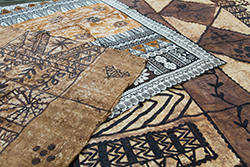 Polynesian barkcloth , known as “tapas”, are made from pounded tree bark soaked in saltwater. These highly geometric patterns are used for ceremonial purposes (much like our “red carpets”) as well as decorative. Tapas of same quality are found in the Australian Museum and others worldwide.
Polynesian barkcloth , known as “tapas”, are made from pounded tree bark soaked in saltwater. These highly geometric patterns are used for ceremonial purposes (much like our “red carpets”) as well as decorative. Tapas of same quality are found in the Australian Museum and others worldwide.
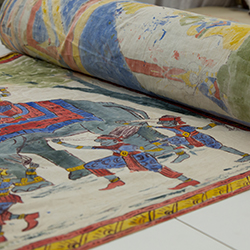 A folkloric hand painted mural for the illiterate population illustrating the history of Siam becoming Thailand. This image of Buddha’s enlightenment’s is the first image on the mural & represents Thailand’s spiritual history.
A folkloric hand painted mural for the illiterate population illustrating the history of Siam becoming Thailand. This image of Buddha’s enlightenment’s is the first image on the mural & represents Thailand’s spiritual history.
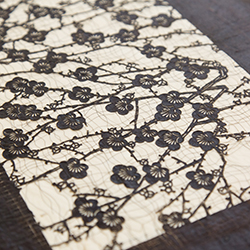 Hand cut Japanese stencils made from layered Mulberry bark paper, using human hair between layers for reinforcement when printing kimonos or other textiles.
Hand cut Japanese stencils made from layered Mulberry bark paper, using human hair between layers for reinforcement when printing kimonos or other textiles.
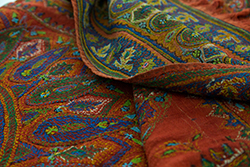 Persian documents featuring hand embroidered paisleys 1820-1870
Persian documents featuring hand embroidered paisleys 1820-1870
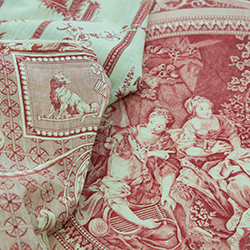 French Toile from the 18th Century
French Toile from the 18th Century
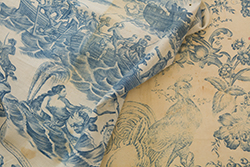 English Toile from the 18th Century
English Toile from the 18th Century
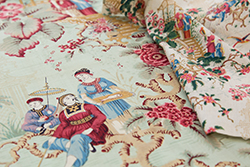 Chinoiseries from 19th Century
Chinoiseries from 19th Century
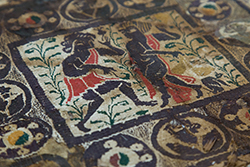 The archive also contains Coptic designs from Egypt from the second century to the fifth century AD
The archive also contains Coptic designs from Egypt from the second century to the fifth century AD
 Scott Kravet, Chief Creative Director, Kravet in archive room
Scott Kravet, Chief Creative Director, Kravet in archive room Polynesian barkcloth , known as “tapas”, are made from pounded tree bark soaked in saltwater. These highly geometric patterns are used for ceremonial purposes (much like our “red carpets”) as well as decorative. Tapas of same quality are found in the Australian Museum and others worldwide.
Polynesian barkcloth , known as “tapas”, are made from pounded tree bark soaked in saltwater. These highly geometric patterns are used for ceremonial purposes (much like our “red carpets”) as well as decorative. Tapas of same quality are found in the Australian Museum and others worldwide. A folkloric hand painted mural for the illiterate population illustrating the history of Siam becoming Thailand. This image of Buddha’s enlightenment’s is the first image on the mural & represents Thailand’s spiritual history.
A folkloric hand painted mural for the illiterate population illustrating the history of Siam becoming Thailand. This image of Buddha’s enlightenment’s is the first image on the mural & represents Thailand’s spiritual history. Hand cut Japanese stencils made from layered Mulberry bark paper, using human hair between layers for reinforcement when printing kimonos or other textiles.
Hand cut Japanese stencils made from layered Mulberry bark paper, using human hair between layers for reinforcement when printing kimonos or other textiles. Persian documents featuring hand embroidered paisleys 1820-1870
Persian documents featuring hand embroidered paisleys 1820-1870 French Toile from the 18th Century
French Toile from the 18th Century English Toile from the 18th Century
English Toile from the 18th Century Chinoiseries from 19th Century
Chinoiseries from 19th Century The archive also contains Coptic designs from Egypt from the second century to the fifth century AD
The archive also contains Coptic designs from Egypt from the second century to the fifth century AD















